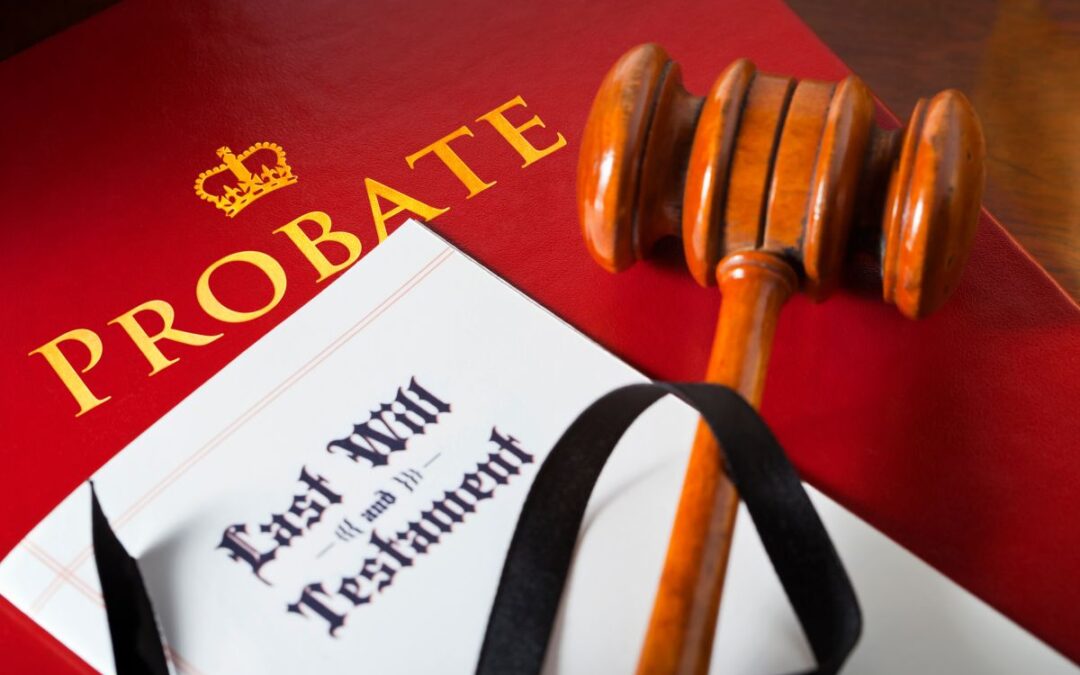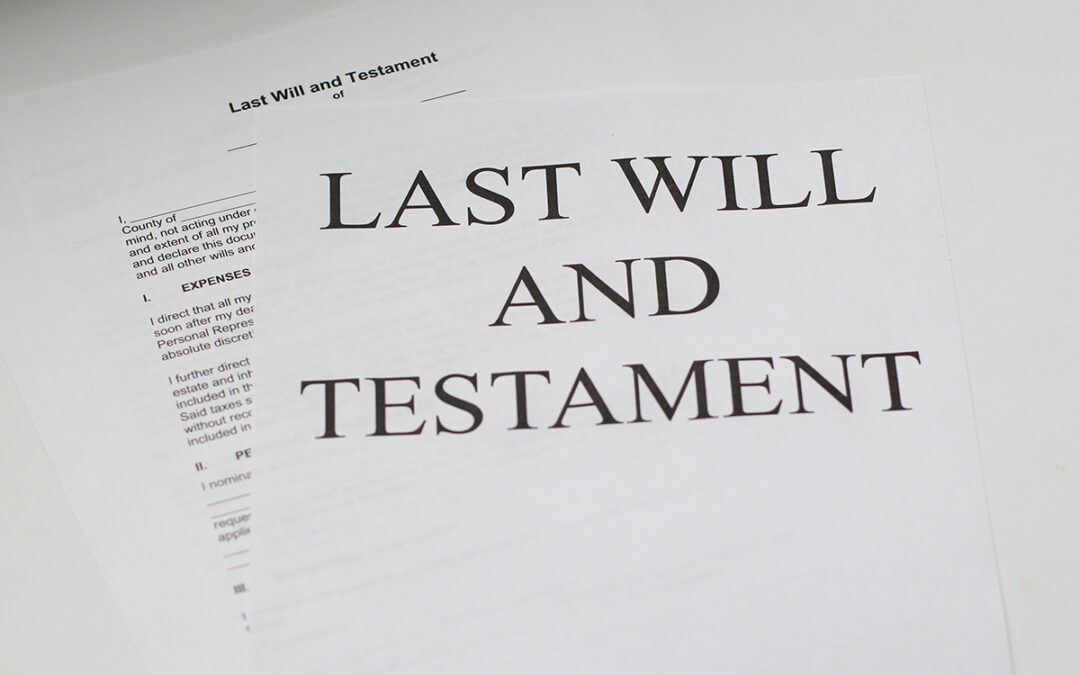
Feb 21, 2024 | Wills and Estates
What is a grant of probate?
A grant of probate is a legal document issued by the Supreme Court that validates a recently deceased person’s Will. The document certifies that the testator (the person who made the Will) has passed away and created a valid Will. It also authorises the named executor/s to distribute the deceased’s estate in accordance with the terms of the Will.
How do I file a grant of probate application?
Following the death of the testator, the named executor/s must apply for grant of probate with the Supreme Court. The application must contain supporting documentation to assist the Court in validating the Will. These documents include:
- The deceased’s original Will
- Any codicils (formal alterations to the original Will)
- The testator’s death certificate.
The application must also provide a summary of the deceased’s assets, liabilities, any other named executors, and a list of the beneficiaries to the Will.
Once granted, the executor/s to the Will can settle outstanding debts, compile the deceased’s assets and distribute the estate to beneficiaries.
A grant of probate application must be filed within 6 months of the testator’s death. If the application is filed beyond this deadline, there must be a reasonable explanation for the delay.
Can I contest a grant of probate?
Yes, a grant of probate can be contested before the Supreme Court grants probate to the executor. A grant of probate can be contested by lodging a probate caveat.
A probate caveat notifies the Supreme Court that the probate application is being contested. The caveat will prevent the Court from granting probate until the person contesting the grant (caveator) has demonstrated their interest in the estate.
In NSW, the rules surrounding caveats are found under division 10 of the Supreme Court Rules 1970. The rules permit any person with an interest in the estate to “file a caveat in respect of any grant of probate or administration.”
For a probate caveat to be successful, it must challenge the validity of the Will. The decision of Vea v Katalinic [2020] NSWSC 805 concludes that for a probate caveat to be successful, it must present the Court with circumstances that warrant investigation.
Scenarios that may warrant an investigation include:
- Whether the deceased lacked testamentary capacity.
- Whether the deceased was subject to undue influence or duress when creating the Will.
- If the Will has not complied with legal requirements and is unclear in its interpretation.
- If forgery or other fraudulent behavior was involved in the creation of the Will.
What if a probate caveat is successful?
If the Supreme Court determines the Will is invalid, the Court will give directions to adjust the Will for a just determination of proceedings, or authorise for the probate to be granted in solemn form.
As opposed to common form, where the grant of probate is authorised by a registrar, a grant of probate in solemn form is authorised by a judge in a formal court proceeding. This opens the matter to litigation and requires the caveator to file a statement of claim to initiate the proceedings.
What if probate has already been granted?
If probate has already been granted, it is still possible to file a family provision claim against the Will within 12 months of the death of the deceased. A family provision claim offers eligible persons the opportunity to contest a Will if they believe they have been left out of the Will or deserve a higher provision of the estate.
To learn more, please refer to our free Guide to Family Provision Claims or read an interview with our principal Paul Etherington about the intricacies of inheritance disputes.
Contact Us
If you are planning on contesting a Will or a Grant of Probate, we recommend seeking professional advice. If you would like to discuss a probate matter with an experienced Wills & Estates Lawyer in North Sydney, please contact us on (02) 9963 9800 or via our online contact form.

Aug 30, 2023 | Wills and Estates
What is an Enduring Power of Attorney?
An Enduring Power of Attorney (EPOA) appoints a person, or persons, to make legal and financial decisions on your behalf once you have lost the mental capacity to make these decisions on your own due to a serious illness or injury.
If your EPOA is not explicit in its instructions, it is possible for your attorney to authorise transactions which will result in a substantial reduction in your estate’s value. This may be demonstrated through an excessive withdrawal of funds or the closing of bank accounts. In other circumstances, an attorney may sell assets or transfer real estate to their own name.
How to protect your assets in your Enduring Power of Attorney
Misuse of an EPOA can be prevented by ensuring that you have written clear and comprehensive instructions on every legal, financial and personal matter that is significant to you.
Choosing a trustworthy attorney/s is paramount to protecting your interests. It is best to appoint someone who knows you well and can anticipate your needs. Your attorney/s should respect your decisions and be objective when needed. For more information on selecting the ideal attorney and the circumstances in which a Power of Attorney is important, please refer to our blog or the NSW Trustee & Guardian website.
In your EPOA, you may also elect to have regular third-party checks conducted through audits or annual reviews to ensure that your attorney is appropriately managing your assets.
What should you do if an attorney is misusing their position?
If you do not specify any conditions that your attorney must abide by before you have lost mental capacity, it is possible for your attorney to misuse their authority. Consequently, it is best to enlist a legal professional when preparing your EPOA so you may safeguard the management of your assets and personal wishes.
If you are concerned that an attorney is not acting in the best interests of the person who has lost their mental capacity, you may apply to the NSW Civil and Administrative Tribunal (NCAT) for a review. NCAT will review the operation and effect of an EPOA and can order that an attorney is removed, revoke all or part of the EPOA or appoint a substitute attorney. NCAT can also order an audit on financial records, transactions and accounts made under the EPOA as well as issue an inquiry and report on the conduct of the attorney.
Contact Us
A solicitor at Etheringtons Solicitors can assist you in the creation, amendment or revocation of a Power of Attorney. If you have any concerns regarding an existing EPOA, please contact one of our experienced solicitors on (02) 9963 9800 or via our online contact form.

Jul 30, 2022 | Wills and Estates
Wills and estates can be a confusing topic for many people. However, it is crucial to understand what a will is, how it works, and why you should have one. In this blog article, we cover the common questions related to wills and estates.
What is a Will?
A Will is a document that sets out what a person would like to happen with their assets when they die. Assets may include tangible property – such as houses or cars – or intangible property, such as superannuation or savings. When you pass away, the executor of your estate (someone you have appointed) distributes your will, and gives the assets you have allocated to each person.
Why should I have a Will?
- To ensure your family’s needs are met according to your wishes when you die
- To avoid leaving confusion behind
- To set out plans beyond the distribution of your wealth and assets. For example, a Will can include other requests such as:
- How children will be cared for
- The exclusion of particular family members
- The distribution of assets that do not form part of your estate (e.g. family trust assets)
- Charitable objectives (e.g. if there is any money left over after distributing to family members, you may donate the rest of your estate to a particular charity or cause)
- Who will be the executor of your estate. If you die without picking your executor, your closest family member will become the executor. You may also request that the public Trustee & Guardian (a government agency) administer your estate.
When should you review or update a Will?
Your Will should always reflect your current circumstances and intentions. It is therefore necessary to update your Will if you have any major life changes, such as:
- Marriage, separation, divorce or entering into a new relationship
- The birth or death of children, grandchildren or other close relatives
- Significant changes to the value of your assets
- Substantial changes in the way you own assets, such as the creation of a family trust or a self managed superannuation fund
- If you enter a new business or change the structure of your current business
- Changes in the residency status of you or your intended beneficiaries.
- Retirement from full time employment
- Significant changes to taxation, superannuation and social security laws which may impact upon your Will and estate
How can I challenge a Will?
If you believe you have been unfairly left out of someone’s Will, there are avenues to rectify this.
Family members, spouses, partners and anyone else who can show that they were financially dependent on the deceased person may be able to challenge a Will. However, there are strict time deadlines to challenge a Will, so it is crucial to seek legal advice immediately if you are contemplating this process.
There are different claims that can be made in relation to a Will. These include:
- Family maintenance
- Lack of testamentary capacity
- Undue influence
- Breach of trust
- Power of attorney
- Guardianship
- Administration
If you have been appointed or named as executor of a deceased person’s estate and you receive notice that someone is challenging the Will, it is necessary to receive prompt legal advice.
How to administer an estate?
An executor is responsible for protecting the assets of a deceased’s estate, dealing with any necessary administration (such as unpaid debts or incomplete business transactions) and distributing the estate according to the Will.
There are a number of things an executor should do upon being named:
- Notify government agencies and other institutions about the death so liabilities do not continue and any necessary income (such as pensions) is stopped
- Confirm all of the assets and liabilities of the estate. This involves writing to financial institutions, government agencies, relevant companies, searching records (Land Titles Office) and preparing an inventory of household furniture and personal effects.
- Apply for a Grant of Probate from the Supreme Court to administer the estate. This document legally authorises the executor to deal with all matters relating to the estate.
When probate has been granted, the executor must lodge a final tax return on the behalf of the deceased, redeem bank accounts and investments, sell or transfer any real estate and motor vehicles and pay any liabilities.
Once these matters have been finalised, the executor can distribute the estate to the beneficiaries as outlined in the Will.
Get Legal Advice
Wills and Estates can be a complex area of law. If you or someone you know wants more information or needs help or advice, please contact us on (02) 9963 9800 or contact us via our form. If you would like to prepare your will with us, please fill out the Will Instruction Form and we will contact you.

Jul 27, 2022 | Wills and Estates
Around 40% of Australians do not have a will, with the majority of that group citing procrastination as the main reason for not having made a will. But when unexpected events occur, a valid will ensures your children are taken care of, tax is minimized and your estate is distributed in the way you prefer. Luckily, wills are inexpensive and easy to write with the help of a lawyer.
So, do you need a will? Here are 4 reasons why making a will should be a priority:
1. Minor children are taken care of
If you have children under the age of 18, a will can be used to nominate guardians for those children in the event that you pass away. A will can also detail how you would like your children’s education and maintenance to be managed, such as if you would like them to attend a particular school. Additionally, you can designate the assets you intend to leave in trust for your children, and nominate the trustees who will manage these assets.
2. Limit stress for family
The distribution of one’s estate can be a stressful and difficult time for family members. To ease this burden on your relative, a will allows you to specifically decide who will receive what possessions. This minimizes the chance that your will will be contested, and helps prevent conflict between family members.
3. Protects assets for unmarried couples
Assets are not automatically transferred between couples who are cohabitating if they are not in a defacto relationship or married. If you would like your assets to be transferred to your partner upon your death, it is important to specifically state this in your will.
4. Nominate an executor
A will can be used to nominate a trusted friend or family member to act as the executor of your estate. The executor distributes the assets in the estate, helps settle your debts and attempts to fulfill the requests you have made in your will.
How Etheringtons Solicitors can help
If you or someone you know wants more information or needs help or advice, please contact us on (02) 9963 9800 or contact us via our contact form. If you would like to prepare your will with us, please fill out the Will Instruction Form and we will contact you.

Jul 25, 2022 | Wills and Estates
Superannuation benefits are not automatically assets that fall within the estate of a person after their death. Without additional and proper written directions, what happens to a person’s super after death is decided by the Trustee of that person’s super fund.
What is a Self-Managed Super Fund (SMSF)?
A self-managed super fund is a body that helps provide for individuals retirement. Members of an SMSF are typically the trustees of the fund, or they may be the directors. Essentially, the members of the fund run the fund for their own benefit.
With well over half a million SMSFs now registered in Australia, more and more people have direct control over their superannuation as trustees of their own funds. However, without careful consideration and planning, your superannuation funds may not end up where you want them to after your death, as was recently the case in Western Australia.
Case Study
In a recent WA case, Ioppola v Conti, a husband and wife were the only members of a SMSF. In her Will, the wife explicitly stated that her substantial superannuation funds were to be divided between her children and not her husband.
However, she did not have the proper written documentation prepared in her SMSF to reflect this choice. Upon her death, her husband, despite the Will paid all his wife’s funds to himself. This power was given to the husband under the SMSF’s trust deed, which granted all trustees broad discretion.
Outcome
The children challenged the actions of the husband in the Supreme Court of Western Australia, arguing that as executors they should be appointed as joint trustees of the SMSF along with their father, to have some measure of control over the distribution of their mother’s funds. This argument was rejected on the grounds that while superannuation legislation does allow for such an appointment, it is not mandatory.
The children also argued that the trustee did not act in a bona fide manner as required by the SMSF’s trust deed. This argument was also rejected on the basis that the trustee was entitled to ignore the directions of the Will when making their decision.
The court held that the husband was able to retain the superannuation.
How to Avoid Similar Situations
This situation could have been avoided if the wife had a binding death nomination or a death benefit agreement in place at the time of her death.
- A binding death nomination is a written direction from a member to their superannuation trustee setting out how they want their superannuation benefits to be distributed on death.
- A death benefit agreement is an agreement between an SMSF member and the trustee, which specifies how the member’s benefits are to be paid after their death.
A binding death nomination must be renewed every 3 years while a death benefit agreement is permanent until revoked.
A solicitor who is preparing a Will for you can identify issues that may arise and ensure that your true intentions are properly documented.
The above illustrates why it is best not to use DIY Will kits and to get proper advice, as it gives your loved ones proper protection and gives you peace of mind.

Jul 21, 2022 | Wills and Estates
Can You Put Anything You Like in Your Will?
When it comes to writing your own will, you may think you should be able to divide your assets however you like.
However, the law takes into account moral responsibilities owed to family members. Although they are your assets to divide, these laws protect your family from being unfairly disadvantaged.
Contesting a Will
If you feel the assets in a family member’s or close friends will have been unfairly allocated, you can contest the will. The law recognises that sometimes you might need to make a claim against a deceased person’s estate, and the court can make orders to allow you to have more than what is specified in the will.
The court will determine how much more is appropriate, by considering factors such as:
- Whether the person making a claim is an eligible person (as defined by the law);
- Whether there are circumstances which justify the making of orders allowing a claim; and
- Whether there has been adequate provision made in the will for the proper maintenance, education or advancement in life of that person.
Factors for Consideration
The court will also consider several discretionary factors when making orders to allow a portion of a deceased’s estate to be given to the claimant:
- The nature and quality of the relationship between the person making the claim and the deceased;
- The means and needs of the person making the claim compared with the size of the estate;
- and Other factors such as:
- Whether and to what extent the person making the claim contributed to the property and welfare of the deceased person;
- The character and conduct of the person making the claim before and after the death of the deceased;
- Circumstances before and after the deceased person’s death; and
- Any other matters the court considers relevant including things which were in existence before or after the deceased person’s death.
It is clear that the law prioritises fairness in the distribution of an estate. However, what the court considers ‘fair’ will vary, depending on your individual circumstances. Please get in touch if you have any questions about your will and estate.






